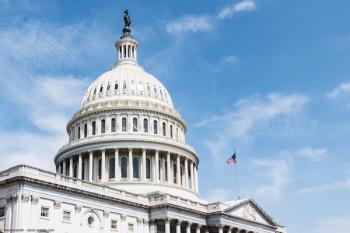
Urology groups react to USPSTF grades
The final recommendation on screening for prostate cancer issued May 8 by the U.S. Preventive Services Task Force, which gives a “C” grade for PSA testing in men 55-70 years of age, has been met with mixed reviews by prostate cancer-focused organizations, some of which continue to call for legislation to reform the task force itself.
The final recommendation on screening for prostate cancer issued May 8 by the U.S. Preventive Services Task Force (USPSTF), which gives a “C” grade for PSA testing in men 55-70 years of age, has been met with mixed reviews by prostate cancer-focused organizations, some of which continue to call for legislation to reform the task force itself.
While the AUA issued a statement commending the USPSTF on its recommendations and its process for developing them, LUGPA was sharply critical, expressing “grave concerns” about aspects of its ruling.
Groups advocate for reform bill
Both groups, however, said legislation to reform the USPSTF process, the USPSTF Transparency and Accountability Act of 2017, should be enacted.
The AUA said the task force’s final recommendations “demonstrate the value of involving specialists, patients and the medical community in creating reasonable and thoughtful clinical guidance,” and thanked the USPSTF for soliciting community feedback, engaging urologists to review the evidence on which its recommendations were based, and considering comments from the prostate cancer community.
But it also commended Reps. Marsha Blackburn (R-TN), Bobby Rush (D-IL), and other lawmakers for encouraging the USPSTF to adopt a more transparent process and said their legislation, the USPSTF Transparency and Accountability Act, “is needed to ensure transparency and regular input in the process from interested stakeholders and specialists with appropriate expertise.”
However, LUGPA President Neal Shore, MD, a Myrtle Beach, SC urologist, said the USPSTF’s decision to finalize the draft recommendations released more than a year ago “is the byproduct of a process that is neither open nor transparent.”
“The USPSTF continues to be exempt from the Federal Advisory Committee Act; as such, it is not obliged to hold meetings in public, consider public comments, disclose its methodology, nor is there any recourse for those harmed by its decisions,” Dr. Shore said. The legislation, he contended, is needed to provide “common sense reforms that both preserve the advisory capacity of the USPSTF while simultaneously restoring basic oversights that apply to all advisory committees with similar authority.”
The USPSTF’s final recommendation states that men ages 55-69 years should make an individual decision about whether to get PSA-based screening for prostate cancer after discussing potential benefits and harms with their clinician, considering their specific clinical circumstances and incorporating their values in the decision-a “C” recommendation.
For men 70 years of age and older, the USPSTF continues to recommend against PSA-based screening-a “D” recommendation.
The task force said the final recommendation applies to all adult men who have no signs or symptoms of prostate cancer and who have never been diagnosed with the disease. It includes men at increased risk, such as African-American men and men with a family history of prostate cancer.
“For men who are more interested in the small potential benefit and willing to accept the potential harms, screening may be the right choice for them,” said task force Vice Chair Douglas K. Owens, MD, a general internist and associate director of the Center for Innovation to Implementation at the Veterans Affairs Palo Alto Health System. “Men who place more value on avoiding the potential harms may choose not to be screened.”
The AUA said it agreed with the USPSTF that African-American men and men with a family history of prostate cancer are at increased risk and should discuss with their physicians the benefits and risks of testing in order to make a shared, informed decision.
However, the AUA said that although it agrees that “a number of older men are not candidates for prostate cancer testing, we believe that select, older, healthier men may garner a benefit. We urge those men to talk with their doctors about whether prostate cancer testing is right for them.”
The AUA acknowledged that there is “limited evidence” regarding the benefits and risks of prostate cancer testing in men over 70 years of age, and that it supports additional research to “better inform recommendations for these individuals.”
Next:
“Our organization has grave concerns that the USPSTF continues to minimize the importance of shared decision-making for both older men in good health and younger men at high risk, both populations that may benefit from prostate cancer screening,” Dr. Shore said. “The application of arbitrary age cutoffs negates not only physician’s expertise and knowledge of an individual patient’s specific health history, but also undermines recent breakthroughs in molecular and genomic testing that facilitate personalized, precision health care delivery.”
Dr. Shore also said that LUGPA does not believe the recommendation of additional research regarding prostate cancer screening in African-American men and those with a family history of prostate cancer is sufficient.
“There is ample data to suggest that subsequent to the USPSTF’s 2012 Grade ‘D’ recommendation, many fewer men have been screened for prostate cancer and those being diagnosed with prostate cancer are being found with later stage, more aggressive disease,” said Dr. Shore. “Tragically, cure rate for these patients is much lower, potentially leading to unnecessary deaths with prostate cancer.”
During a congressional briefing sponsored by the Congressional Health Caucus and the Men’s Health Network after the USPSTF issued its final recommendations, Alex H. Krist, MD, MPH, vice chairperson of the task force, acknowledged that screenings “will save a few lives from prostate cancer.” Dr. Krist is professor of family medicine and population health at Virginia Commonwealth University, Richmond and an active clinician.
“We believe that the new recommendation will encourage men to take a more active role in their health and wellness,” said Ana Fadich, MPH, CHES, vice president of the Men’s Health Network. “We are hopeful that the task force will be more inclusive of men age 70 and older in future recommendations.”
More research urged
During the briefing, medical experts and advocates from the Veterans Health Council, the AUA, and ZERO-The End of Prostate Cancer urged the task force to solicit more research for high-risk groups.
“It is clear that the science is important in the work that we’re doing,” said Darrell Sabbs, a health advocate and legislative affairs and community benefits manager for Phoebe Putney Health System. “Prostate cancer can kill, but it doesn’t have to kill. A lot of the data we need has not been found.”
Urologist Nilay Gandhi, MD, of Potomac Urology, Alexandria, VA, said the USPSTF’s prostate cancer recommendations “made us abandon our ‘caveman approach’. It really opened our eyes to overdiagnosis. All of this made us smarter. It’s made us better at detecting more aggressive forms of cancer.”
“Providers, too, need to be educated,” added Raegan Durant, MD, MPH, associate professor in the division of preventive medicine at the University of Alabama at Birmingham. “Individual health institutions can play a role in adopting current guidelines. Screening is only the beginning.”
Newsletter
Stay current with the latest urology news and practice-changing insights — sign up now for the essential updates every urologist needs.






